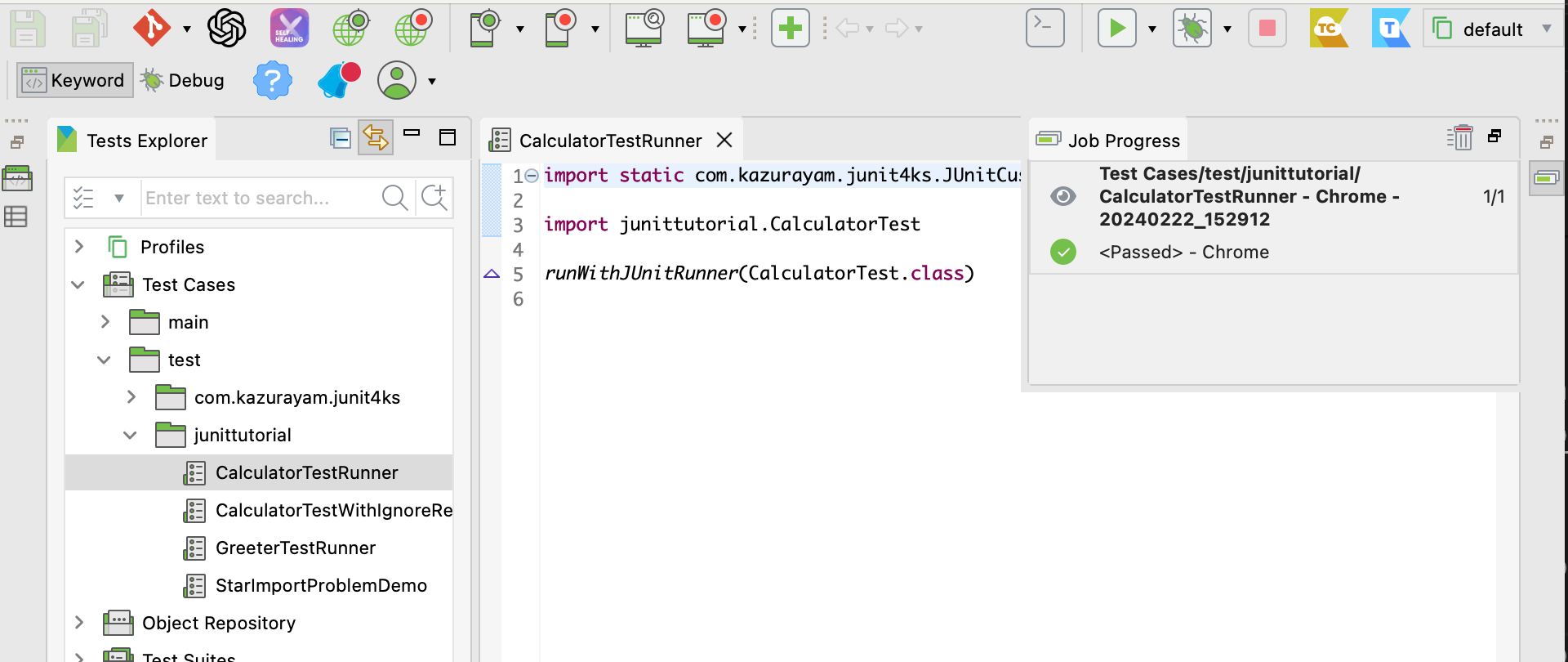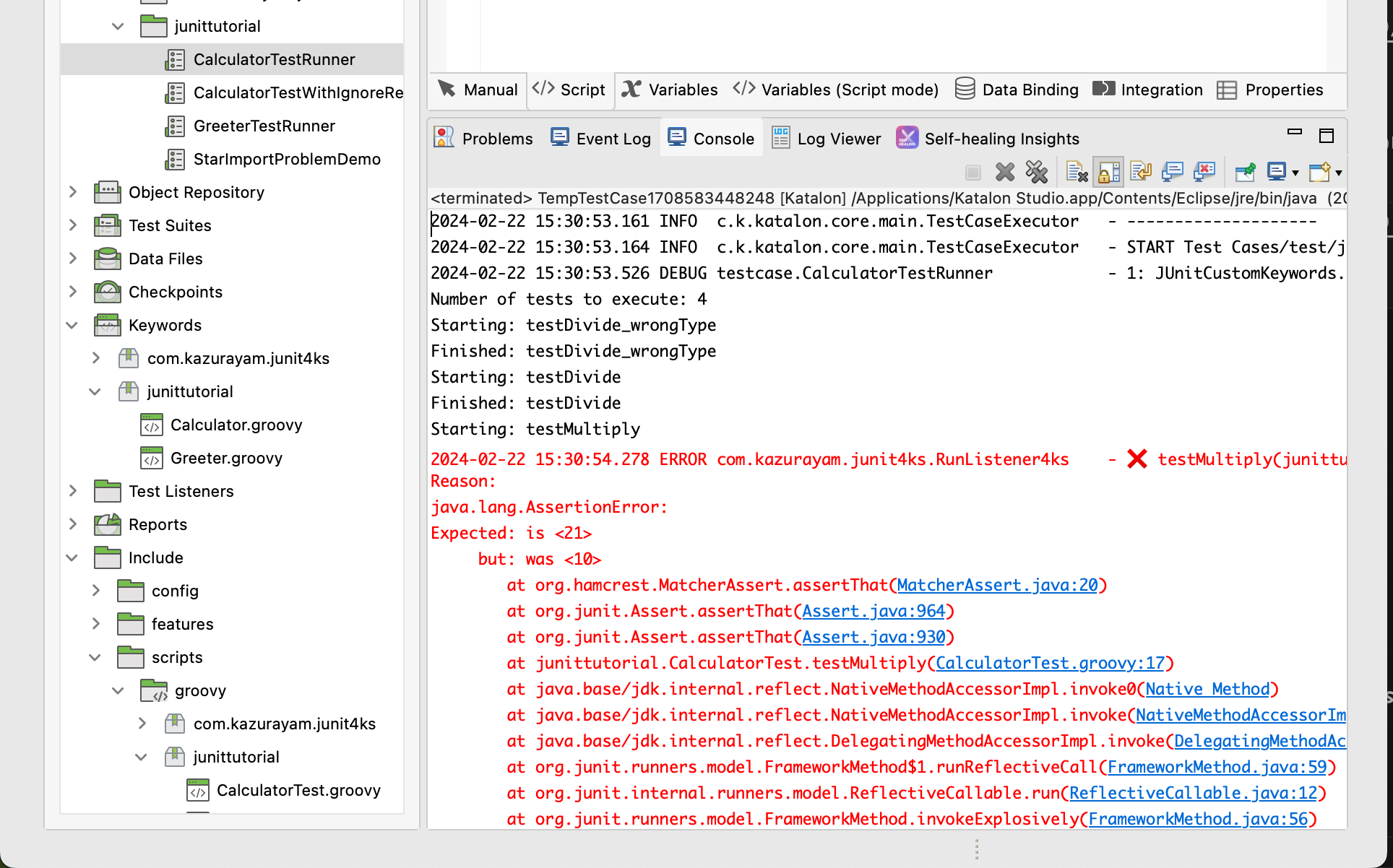by kazurayam
- 1st release at 18 July 2018
- 2nd release at 13 January 2019
- 3rd release at 10 Feb 2019
- 4th release at 20 Feb 2019
- 5th release v1.6.2 at 21 Feb 2024
I wanted to develop a set of Custom Keywords in a Katalon Studio project. See a post in the Katalon Forum: Taking entire page screenshot using AShot in Katalon Studio for the background story. My custom keywords were expected to be large and complexed, therefore bug-prone. I wanted to execute thorough unit-testing on my Groovy classes using JUnit4 framework.
- Use Katalon Studio version 5.7.0 or higher. I used v5.10.1.
- Download the zip file of this project tagged with 1.0 at Releases page and unzip it.
I made a custom keyword classe. I want to test this using JUnit4:
junittutorial.Calculator--- calculator which add/subtract/multiply/divide 2 integers
I made a test classe using JUnit4.
I made a Test Case in the <projectDir>/Test Cases folder. These test case calls JUnit4, which will run the Test class shown above.
The CalculatorTestRunner script is as simple as this:
import static com.kazurayam.junit4ks.JUnitCustomKeywords.runWithJUnitRunner
import junittutorial.CalculatorTest
runWithJUnitRunner(CalculatorTest.class)
You can run these test cases just as usual Katalon Studio test case.
When it finished, you can see the test result output in the Log Viewer and Console in Katalon Studio GUI.
You may expect a report file in XML will be generated, but unfortunately my junit4ks does not do it.
You can download the latest jar file for
Download the junit4ks-x.x.x.jar file and locate it into the Drivers folder of your Katalon Studio project.
The groovydoc of junit4ks is here
I like 'Spock' because of its @IgnoreRest annotation. I wanted to use @IgnoreRest in my test on JUnit as well. One day I found a nice article: http://www.qualityontime.eu/articles/technology-stack/toolbox/junit-ignorerest/
I implemented the proposded code into the junit4ks.
See Include/scripts/groovy/junittutorial/CalculatorWithIgnoreRestTest.groovy:
package junittutorial
import static org.hamcrest.CoreMatchers.*
import static org.junit.Assert.*
import org.junit.Test
import org.junit.runner.RunWith
import org.junit.runners.JUnit4
import com.kazurayam.junit4ks.IgnoreRestSupportRunner
import com.kazurayam.junit4ks.IgnoreRest
@RunWith(IgnoreRestSupportRunner.class)
class CalculatorWithIgnoreRestTest {
@Test
@IgnoreRest
void testMultiply() {
int expected = 21
int actual = Calculator.multiply(7, 3)
assertThat(actual, is(expected))
}
@Test
void testDivide_wrongType() {
double expected = 1.5f
double actual = Calculator.divide(3, 2)
assertThat(actual, is(not(expected)))
}
}
One day in April 2018 I created a test case of single line:
import org.junit.runner.JUnitCore
This worked! The import statement succeeded. No error was emitted. I realized that the JUnit classes are available in the Katalon Studio's Java VM. Later I found that the Katalon Studio's distribution contains plugins/org.junit_4.12.0.jar.
OK, all I need to know is where to locate test classes, how to activate the runner, and how to report the result. I have done an experiment. I believe I have got a success. Tag 0.2 of this repository contains this version of my attempt. This version was created at April 2018.
The first attempt worked, but I thought the method was too lenghthy and complicated. I wanted to find out an easier one.
Dec 2018, devalex88 (Katalon Developer) proposed a new approach at https://forum.katalon.com/t/how-to-write-katalon-studio-tests-with-intellij-idea-and-other-ides/15940 .
The idea includes:
- Since version 5.7.0,
.classpathfile in a Katalon Studio project contains a line<classpathentry kind="src" output="bin/groovy" path="Include/scripts/groovy"/>. This line defines a build path acknowledged Katalon Studio(=Eclipse). All of*.groovyfiles located in this folder will be compiled (when saved) by the Groovy compiler in Katalon Studio. - It is OK for us to locate
*Test.groovyfiles for unit-testing in theInclude/scripts/groovyfolder. - We can use Eclipse to run JUnit. We can open a katalon project with Eclipse (not Katalon Studio)! The built-in feature of Eclipse will look after activating the JUnit tests and reporting the results.
However I gave up this approach, because I could not test my custom keyword, within Eclipse, which interacts with web sites via WebDriver. See this post for detail.
In December 2018, I thought that I could test my Custom Keywords using the BDD feature with Cucumber in Katalon Studio. I learned the following manual pages.
It seemed OK. I could nearly achieve what I wanted to do. But unfortunately I was blocked by a defect in Katalon Studio:
I could not rely on Cucumber in Katalon Studio.
In January 2019 I read the source of com.kms.katalon.core.cucumber.keyword.CucumberBuiltinKeywords on GitHub. CucumberBuiltinKeywords is the core part of Cucumber-Katalon integration. I studied it to find that I could mimic that to implement JUnit-Katalon integration. So I made a new custom keyword class com.kazurayam.ksbackyard.junit.JUnitCustomKeywords. This looks working fine.
A long and winding road it was. I believe I have found out a satisfactory method to test my custom keywords with JUnit4 within Katalon Studio. I publish it as the 2nd release of my demo project.
Later, 10 Feb 2019, I changed the package name from com.kazurayam.ksbackyard.junit to com.kazurayam.junit4ks, having "JUnit4 for Katalon Studio" in mind, for getting better understood what it is. Also note, @devallex88 made a contribution to this.

